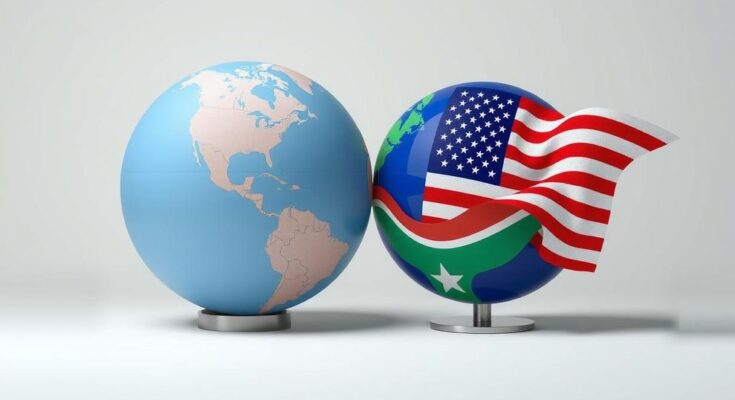Opposition parties in South Africa urged President Cyril Ramaphosa not to yield to U.S. pressure following the expulsion of Ambassador Ebrahim Rasool. This incident reflects increasing tensions between the two nations, with key political figures condemning perceived U.S. bullying. Furthermore, discussions arose regarding the appropriateness of the ANC’s exclusive control over foreign policy appointments, amidst ongoing criticism from the Trump administration.
Opposition parties in South Africa have urged President Cyril Ramaphosa not to succumb to pressure from the United States, following the expulsion of Ambassador Ebrahim Rasool. Washington provided Rasool with a mere 72 hours to depart after U.S. Secretary of State Marco Rubio labeled him a “race-baiting politician who hates America”. Tensions have escalated between the two nations since the Trump administration took office, leading to reflections on diplomatic decorum.
While Minister of International Relations Ronald Lamola remarked that “it is not helpful to engage in Twitter diplomacy” and advocated for direct dialogue, other political figures expressed stronger condemnations. The Economic Freedom Fighters (EFF), led by Julius Malema, issued an emphatic response, imploring President Ramaphosa to resist being “bullied by the orange clown occupying the White House”.
Pan Africanist Congress (PAC) Secretary General Apa Pooe criticized the American decision as an attack on South Africa’s sovereignty, positing, “SA is not a puppet of the US, we have the right to govern our country without any interference.” This development comes amidst ongoing criticism from Trump regarding South Africa’s land reform policy, which permits expropriation without compensation.
This incident also follows Trump’s recent funding cuts, justified by claims of discrimination against South Africa’s white Afrikaner minority, allegations the country has firmly rejected. Ebrahim Rasool, recalled as ambassador following his previous tenure from 2010 to 2015 under Barack Obama, faces difficulties in establishing rapport with the current administration despite his considerable experience and networks.
The Democratic Alliance (DA), part of South Africa’s ruling coalition, has questioned the appropriateness of the African National Congress (ANC) unilaterally appointing foreign diplomats, given its minority status in government. DA spokesperson Willie Aucamp criticized the ANC’s dominance in foreign policy matters and suggested that all coalition members should participate in addressing diplomatic challenges with Washington.
In summary, the expulsion of Ambassador Ebrahim Rasool by the United States has triggered a significant response from opposition parties in South Africa, urging the government to maintain its sovereignty and resist external pressures. Minister Lamola called for direct communication over social media exchanges, while various political leaders denounced the United States’ actions as undermining South Africa’s independence. Ongoing tensions highlight the complexities of international relations amid changing political landscapes.
Original Source: www.bbc.com




